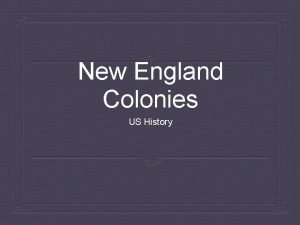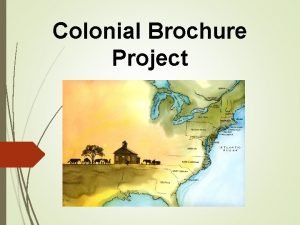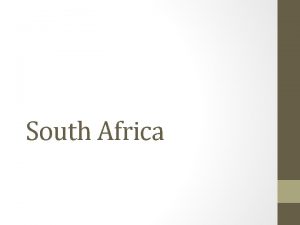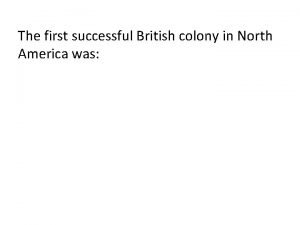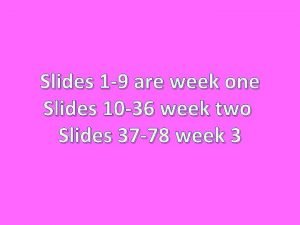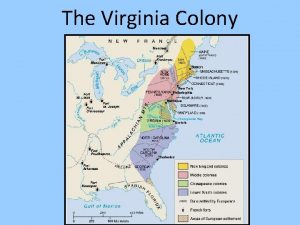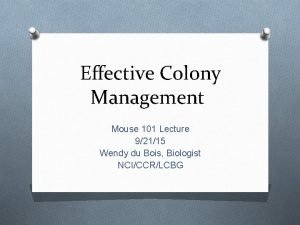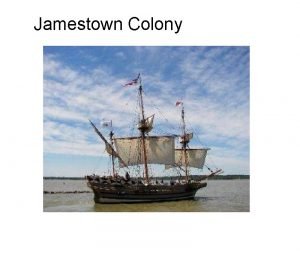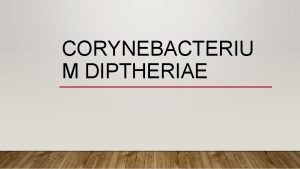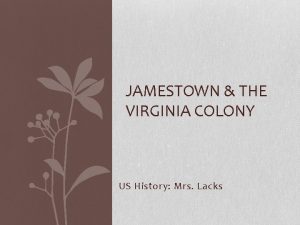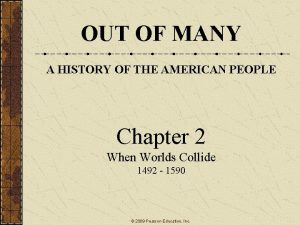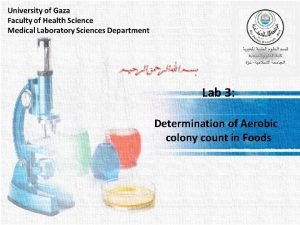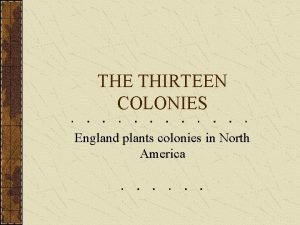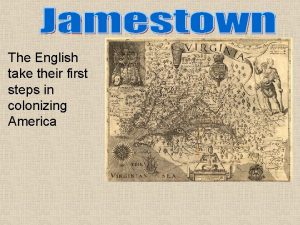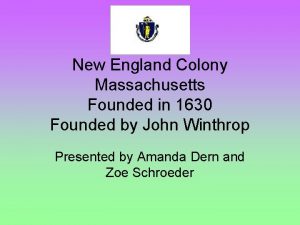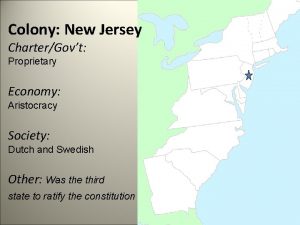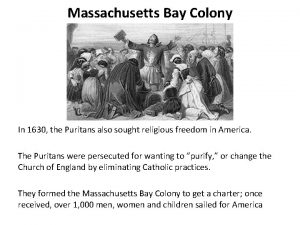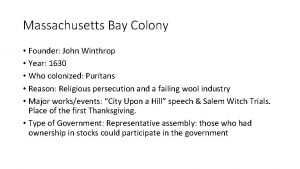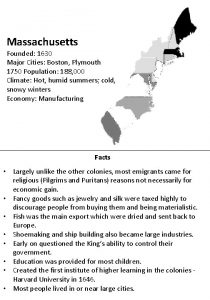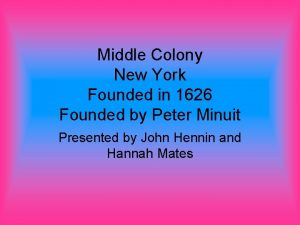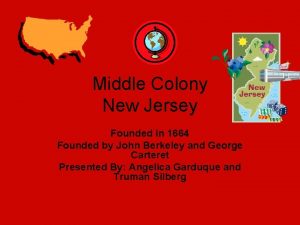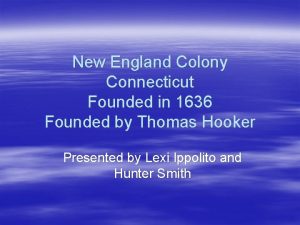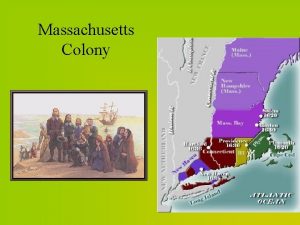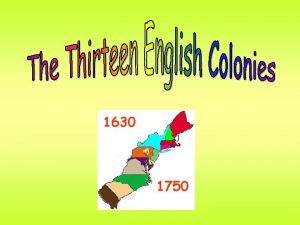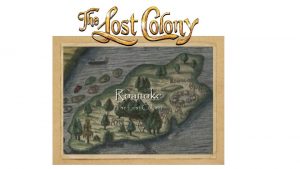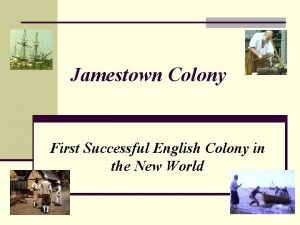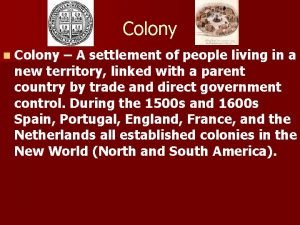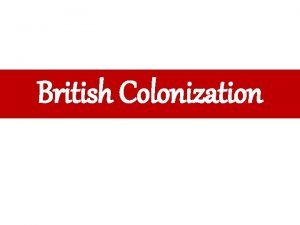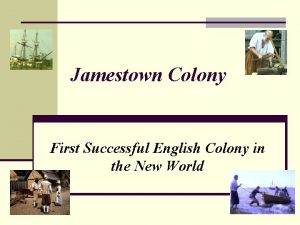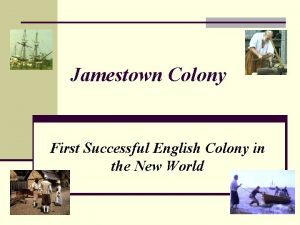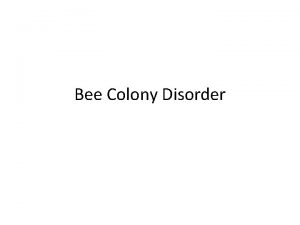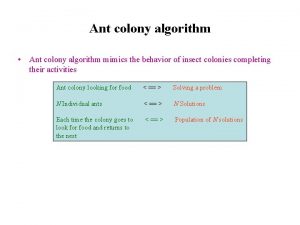Colony Massachusetts CharterGovt Massachusetts was founded in 1630


























- Slides: 26

Colony: Massachusetts Charter/Gov’t: Massachusetts was founded in 1630. The Mayflower Compact was the charter that the men created to set rules for the colony. Economy: Massachusetts major Exports are fishing, corn, livestock, lumbering, and shipbuilding. Society: The society of Massachusetts was highly religious. Also the Native Americans and citizens of Massachusetts lived together in peace for approximately 50 years. Other: Capital City: Boston Flower: Mayflower Tree: American Elm Nicknames: Bay State, Old Colony State Origin of Name: From Massachusetts tribe of Native Americans, meaning “at or about the great hill. ” Ricky Mikolajczyk

Colony: Massachusetts Charter/Gov’t: Massachusetts was founded in 1630. The Mayflower Compact set the rules that would guide the pilgrims in establishing a community. Economy: Major industries included fishing, corn, livestock, Lumbering, and shipbuilding. Society: The people had a society based mercy and justice as well as a very religious colony. Other: In June through September of 1692, nineteen men and women were convicted of witchcraft and hung. http: //www. timepage. org/spl/13 colony. html Erin Zlockie

Colony: Rhode Island Charter/Gov’t: The Rhode Island Royal Charter of 1663 was granted by King Charles II and this was in enforcement until it’s 1843 adoption of the constitution. Economy: Rhode Island’s economy depends primarily on fishing, as well as shipbuilding, farming, and trade. Society: Rhode Island was a place of religious freedom. Relationships with the Natives were very peaceful here. Other: Capital City: Providence Area: 1, 045 square miles State Motto: Hope Nickname: The Ocean State William Gardner

Colony: Rhode Island (1636) Charter/Gov’t: • Established as a Corprate colony • Received a Royal Charter in 1663 Economy: • More mixed than other New England colonies • Better soil and warmer climate made agriculture more profitable • Raised livestock • Easy water access made the fishing industry to flourish Society: • Town meetings • Religious freedom Other: • Last colony • Settled by Roger Williams after leaving Massachusetts Betsy Wetherby

Colony: RHODE ISLAND Charter/Gov’t: Rhode Island was under a Royal Charter which went into effect in 1663. Economy: Rhode Island’s primary sources of income were agriculture, fishing, and timber. Society: Rhode Island was founded based on religious tolerance, so there were many practicing religions which were not accepted in the other colonies. Family was a key to society, gluing the colony together. Other: Rhode Island was the first colony to declare independence from England, over 2 months before the others.

Colony: New Hampshire Charter/Gov’t: Founded 1638 by John Mason Received its own royal charter in 1680. Shared a governor with Massachusetts from 1689 -1692 Economy: Relied on agriculture, fishing, whaling, and textiles Society: Mostly Puritan, With very little religious toleration Other: The New Hampshire Colony was founded in 1638 by Capt. John Mason

Colony: Connecticut Charter/Gov’t: Governed by the “Fundamental Orders” constitution when established in 1639; Became a charter colony in 1662 when they became a recognized colony of England. Economy: Mainly was shaped by the agriculture and started a market-type economy. Mainly dealt with fishing, lumber, and ship-building. Added livestock into trade. Society: Mostly made up of Puritans; Religious freedom was encouraged; Antislavery became an early policy; Had more political freedom than most colonies Other: considered to have had the first constitution in the American By: Corie Both colonies with the “Fundamental Orders”;

Colony: Connecticut Charter/Gov’t: 1662: Charter granted by King Charles II, governed by English law Economy: Connecticut was a corporate colony, meaning the Connecticut company had control of the economy which was based mainly on fishing, lumber, and ship building. Society: The colony was founded in 1636 and was made up of people who left the Massachusetts Bay colony looking for more religious freedom Other: Thomas Hooker, John Haynes and Roger Ludlow wrote a document in 1639 which has been called the first written constitution. This was the Fundamental Orders of Connecticut. It might have been the basis for the United States Constitution. Sarah Knieser

Colony: Charter/Gov’t: Consisted of a Governor, the proprietor, a 72 member Provincial Council, and a larger general assembly. Economy: Somewhat based on farming, exported flower and grain, also known for textile industry, sawmills, and gristmills. Society: Quakerism was the main religion for people in Colonial Pennsylvania. The founder of Pennsylvania himself was a Quaker. Other: The founder of Pennsylvania was William Penn, in 1682.

Colony: Pennsylvania Charter/Gov’t: “Frame of government of Pennsylvania” was A constitution For Pennsylvania. It was a democratic constitution included a council to propose legislation and a general assembler and a governor with veto power and multiple votes in the assembly. Economy: Due to fertile land, forests, and acess to waterways Pennsylvania had an very good Economy. Society: Pennsylvania was mainly a Quaker society and had a good relationship with the native Americans. Other: Founded by William Penn to escape Religious Persecution. Sylvania is based on the Latin word for woods or forests.

Colony: New York Charter/Gov’t: Founded by Peter Minuit in 1626 on Manhattan Island. Economy: Based on manufacturing and agriculture. Society: Was a Proprietary colony, but then in 1685 became a Royal Colony. Other: Originally called New Ansterdam. NY was named for the Duke of York. Became a state on July 26, 1788. Major cities were NYC and Albany. By: Ally Tennant

Colony: Charter/Gov’t: Dutch Charter/ Duke of York called for an Assembly of representatives in 1683 which passed a “charter of liberties”. This charter put the power of the colony under the governor and the citizens would meet in town assemblies. The people established a trial by jury and required no taxation without representation. Economy: Industry: manufacturing (shipbuilding, iron work) agriculture (cattle, grain, rice, indigo, wheat) Society: Every year men would get the fields ready then the women would plant the food. Women farmed and cared for the children and animals while the men went out and hunted and traded with native tribes. If you owned land you were powerful. Other: Albany Congress was established in 1754 to help unite the colonies for defense against the Iroquois Confederacy. The Federalist Papers were published in New York newspapers to sway voters to accept the Constitution. New York was the eleventh state to ratify the Constitution. Zoё Mahler

Colony: New York Charter/Gov’t: Proprietary Economy: Mostly Mercantilist with a mix Of farming Society: Religious beliefs Governed society Other: NYS Constitution Adopted in 1777 and strongly Influenced the U. S. Constitution http: //www. timepage. org/spl/13 colony. html#mass Christian Gayton

Colony: New Jersey Charter/Gov’t: New Jersey started as a proprietary colony ran by George Carteret and John Berkeley. Economy: New Jersey’s economy was very similar to New York’s, it was primarily based on the fur trade and the trade of wheat. Society: The people of New Jersey had two main religions. The primary being Presbyterian and the secondary being Quaker. Other: Originally the first settlements in New Jersey were founded by the Dutch. After being settled by the English, a farm, free for five years, was offered to anyone who had a good musket and six months provisions.

Colony: Charter/Gov’t: Governor Philip Carteret made a settlement at Elizabethtown, where he created a form of government based on “concessions. ” This form of government granted religious liberty to Englishmen, and the law-making was to be executed by a governor, council, and an assembly of twelve elected members, and consent was needed by the assembly to laid out. Economy: New Jersey’s economy was mostly manufacturing, which included ironworking and lumbering. Also, the economy consisted of many farmers and the towns were much like farming communities. Some contact with the Indians led to trading of furs. Society: In 1676, New Jersey was divided into East and West. East Jersey was governed by Philip Carteret and the West was now the property of the Quakers. New Jersey was inhabited by, about, 75, 000 in 1760 most of which were English. Scattered throughout society were the Dutch, Swedish, and the Germans. The colony was not stressed from war with Indians but, instead, was profited by trade of furs and game. Other: New Jersey was originally settled by the Dutch in 1623 as the New Netherlands, but in 1664, Dutch land was taken by the Duke of York from England. New Jersey was, also, in 1787, the third state to ratify the Constitution.

Colony: Delaware Charter/Gov’t: Constitutional Monarchy. Claimed by the Dutch after Hudson discovered it. The Sweedish then claimed it, but finally it came into English hands. Economy: Agriculture, Fishing, and Manufacturing. Society: Founded by Peter Minuit and the New Sweden Company Other: It is located on the Delaware Bay

Colony: Maryland Charter: Maryland was a proprietary colony, meaning it was granted to a single person or group of people and granted complete rights of self government. Economy: Maryland’s economy was primarily based upon the growth and sale of tobacco to England. During the 17 th century, most of the economy was based on small family farms. In the 18 th century, however, larger plantations had started to develop. Society: Maryland started out as a primarily Catholic colony, with tolerant policies. Religious prejudice, however, existed in it’s early years. Throughout it’s history Maryland has shifted from Catholic control to Protestant control to even Puritan control for a short time. Other: Conflict between the Catholics and the Protestants was very heated in Maryland. When the Protestants took over control in 1689, they passed laws outlawing Catholicism in Maryland, a colony primarily started for Catholics. By: Mason Windus

Colony: Maryland Charter/Gov’t: Proprietary Government – Charles I granted the charter in 1632 and the first ship headed to Maryland began the journey in 1633. Economy: Depended mainly on tobacco sales. Slaves and indentured servants were often employed to work the fields of plantations. Society: By 1639, a representative government was formed in which was composed of representatives chosen by the proprietor and freemen, a secretary and a governor. Other: Founded by Lord Baltimore for Roman Catholics to avoid religious persecution. Became known as the haven of Christians. In 1788, it became By: Mac. Kenzie Both the seventh state to ratify the Constitution.

Colony: Virginia Charter/Gov’t: Virginia Company was given Virginia charter in 1606 but revoked in 1624 by King James 1 and made a royal colony Economy: Part of England mercantile system. Grew and traded the cash crop tobacco. Also participated in the salve trade for cheap labor. Society: Plantation Society that participated in slave trade. Protestant religion. Followed Social Structure of England. Other: First colony Roanoke failed First Capital: Jamestown Size: 42, 770 sq miles Flower: American Dogwood Bird: Cardinal Matt Ketchner

Colony: Virginia Charter/Gov’t: The Virginia Company’s charter was to find suitable land gold. Even though they didn’t find gold, they found another suitable way to make money, Tobacco. Cash crops soon turned Virginia into a wealthy colony. The King decided to revoke the charter in order to reap the benefits of the tobacco sales for himself. He transferred it to a Royal Charter in 1624. Virginia became a crown colony. Economy: When the colony first started, tobacco was the main cash crop for the colonists to make money as a whole. But soon after, they began competing in the Slave trade also. Once the colony started to develop and prosper, people moved away from a collective economic system and more towards mercantilism for themselves. Society: Folk music and reading were main forms of entertainment. Bad road systems and harsh winters meant that not many people traveled. People often socialized in groups or with family, rather than separately. Other: Diseases such as diphtheria, yellow fever, and tuberculosis were common in Colonial Virginia. Most of the materials that the colonists owned, were manufactured at home. The harsh winters took a depressing toll on almost everyone.

Colony: North Carolina Charter/Gov’t: Proprietary Economy: Plantation- crops are Indigo, rice, and tobacco Society: Religious Other: Named after King Charles II of England

Colony: South Carolina Charter/Gov’t: The South Carolina colony was founded by eight people with a royal charter from King Charles II. Economy: For money, they started plantation agriculture which included indigo, tobacco, cattle, rice and cotton. Society: South Carolina became a center for rice, tobacco and indigo. As a result, the colony’s plantation owners were one of the wealthiest in the colonies. By the late 1700's, the slaves, which were African American, were a big part of the population of South Carolina as the cotton plantations grew. Other: In 1680, the colony of South Carolina moved to Charles Town, which was later made into Charleston. Cite Work: https: //sites. google. com/a/balboamagnet. com/south-carolina/just-the-facts Kate Huselstein

Colony: South Carolina Charter/Gov’t: Began as a Proprietary colony but became a Royal colony in 1719. Economy: Mercantilist economic system. Everything was produced in order to benefit the mother country. Society: They had large plantation and used slaves. Town meetings and gatherings were scarce due to the distance between people. Other: South Carolina was the eighth state to ratify the Constitution in 1788.

Georgia ● ● Government/Charter given to James Oglethorpe by King George II First Proprietary, then Royal Charter in 1752 Colonist originally had on say in government until 1752 ● Commerce ● Main goods: cotton , indigo, & rice ● Silk production was attempted, but abandoned ● Society ● ● Made up mainly of poor farmers and Protestants looking for escape from the persecution in Europe Slavery and the import of liquor was outlawed until Georgia became a royal colony ● Other ● Last of the original thirteen colonies

Colony: Georgia Charter/Gov’t: Parliamentary Government, paid taxes to England from the beginning. Founded by General James Oglethorpe, used many Protestant values to run the government. Founded around 1752 and was the last of the 13 colonies. The Charter came from King George and the English Parliament. Economy: Most important port city Savannah saw a lot of trade in the beginning, made money off of the natural resources in the area. Slave plantations also existed here. Society: Founded by James Oglethorpe and 35 devout Protestant families, so Protestantism played a big role in society. The earlier settlers also lived relatively peacefully with the Cherokee and Creek Indians. Other: Early settlers in Georgia had to fight many battles with the Spanish of Florida in order to keep their land safe. Although Georgia was the last colony of America it was one of the first states to join the union Sam Eckstrom

Colony: Charter/Gov’t: IN 1629, John Mason received a grant from the Council for England. This grant gave him the land between the Merrimack and Piscataqua rivers, which he named New Hampshire began as a Proprietary colony, but eventually became a royal colony. During its history, it came under Massachusetts’ control. Economy: The New Hampshire colony thrived mainly on fishing, manufacturing textiles, shipbuilding, and farming. Lumber, fish, masts, and turpentine were the main exports from this colony to England. Society: Society in New Hampshire was based, in part, on farming and; therefore, farms were By: Alexa scattered Minard along the countryside. The Puritans established self governing communities and religious congregations. Village and town centers were also a part of the society in this colony. Other: New Hampshire was the 9 first state to have its own constitution. th state to ratify the Constitution. It was also the
 Massachusetts bay colony
Massachusetts bay colony Keplero
Keplero Din en1627
Din en1627 Portaria daee 1630
Portaria daee 1630 Gxp 1630
Gxp 1630 13 colonies brochure project
13 colonies brochure project Cariostat test
Cariostat test Heliocentric vs geocentric venn diagram
Heliocentric vs geocentric venn diagram Musket
Musket The lost colony of roanoke
The lost colony of roanoke Who governed the royal colony of georgia?
Who governed the royal colony of georgia? First successful british colony in america
First successful british colony in america Jamestown colony
Jamestown colony Jamestown colony advertisement
Jamestown colony advertisement Map of the middle colonies
Map of the middle colonies Mouse colony management software
Mouse colony management software First successful english colony
First successful english colony Gonopore cnidaria
Gonopore cnidaria King james 1607
King james 1607 Poached egg colony of corynebacterium
Poached egg colony of corynebacterium Virginia colony
Virginia colony Snyder agar test
Snyder agar test Roanoke colony
Roanoke colony Aerobic colony count in food
Aerobic colony count in food Deleware colony economy
Deleware colony economy John rolfe
John rolfe Compare and contrast trustee period and royal colony
Compare and contrast trustee period and royal colony
